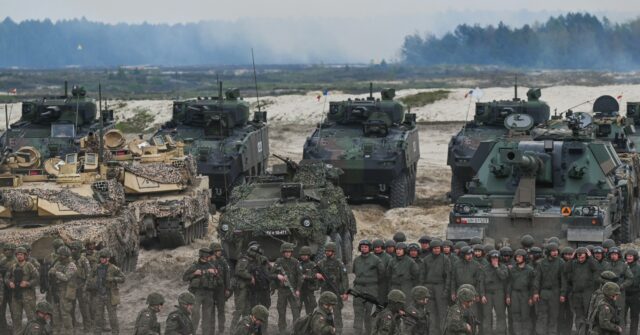The American-led NATO military alliance is planning on staging its largest war games exercise since the end of the Cold War to prepare for a possible invasion from Russia.
Over 40,000 troops from the North Atlantic Treaty Organization (NATO) will be assembled next year for the biggest joint command exercise since the end of the Cold War next year to practice a mission to defend against a Russian military action against one of its 31 members.
The war games exercise, dubbed ‘Steadfast Defender’, will take place next Spring, and is expected to see between 500 and 700 air force combat missions, over 50 naval ships, and approximately 41,000 troops take part, according to the Financial Times. NATO officials told the globalist British paper that it will be designed to simulate a confrontation with a coalition of forces marshalled by Moscow, which will be dubbed ‘Occasus’ during the exercise.
The NATO drill will be conducted in Germany, Poland and across the Baltic states throughout February and March. Sweden, which has yet to be ratified as an official member of the military alliance, will nonetheless also take part in the war games. In addition, NATO will also conduct counterterrorism training outside of its borders, although it has yet to be revealed where this will take place.
As a part of a desire to expand military readiness, the alliance will begin holding two major war games exercises next year, rather than one.
NATO Secretary General Jens Stoltenberg, whose term in office was extended earlier this year in light of the war in Ukraine, said last year that the American-led alliance would seek to expand the number of troops from around 40,000 to “well over 300,000” in order to transform its capabilities into a full-scale military force instead of the lighter role it took in places like Afghanistan.
‘Defeat for All’ — NATO’s Strategy in Ukraine Has Failed, Says Former Italian PMhttps://t.co/YAAjPQ4G5l
— Breitbart London (@BreitbartLondon) August 30, 2023
“Russia has walked away from the partnership and the dialogue that NATO has tried to establish with Russia for many years,” Stoltenberg said following the invasion of Ukraine, which is not currently a NATO member.
“They have chosen confrontation instead of dialogue. We regret that – but of course, then we need to respond to that reality,” the Norwegian added.
Moscow, for its part, has claimed that NATO has violated its promises to not expand “not one inch eastward” after the formerly Soviet-controlled East Germany was incorporated into the alliance following German reunification in the wake of the fall of the Berlin Wall. Western observers take the position that those reassurances were verbal and not enshrined in a treaty, were made to the Soviet Union which no longer exists, and in any case new nations join NATO voluntarily at their request.
NATO’s Baltic state members, Estonia, Latvia, and Lithuania — all of whom also share land borders with Russia — have been the most vocal in calling for the alliance to boost the number of troops stationed in their countries over concerns that the Putin government may seek to re-establish control over the region that has been independent since the collapse of the Soviet Union.
Despite growing calls for the alliance to be strengthened in the wake of the invasion of Ukraine, there has been little in the way of European governments increasing their military spending.
While German Chancellor Olaf Scholz made big noises about his country finally meeting the two per cent of GDP spending requirement, it appears that this will yet again fail to happen. Other major European economies such as France, Denmark, Italy, the Netherlands, and Spain are all projected to be under the threshold this year as well, meaning that NATO’s defence of Europe will continue to fall mostly on the shoulders of American taxpayers.
NATO Chief Agrees With Donald Trump, Europe Should Stump Up More Cash For Military Alliance https://t.co/KxcgHd1lAI pic.twitter.com/KgmShhaCu9
— Breitbart London (@BreitbartLondon) June 8, 2016


